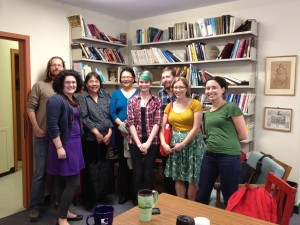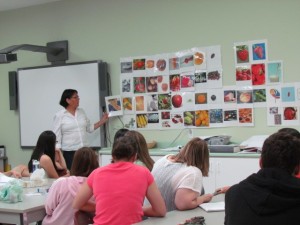Hi guys! CAN-8 Team here, checking in to talk about our meeting with Conor Quinn, and Mary Ann Metallic and Janice Vicaire, as well as set up some plans for the coming weeks.
We talked about a lot of things at this meeting! Some of it was very broad, sweeping things–the linguistics consultants (Mr. Quinn especially!) were focusing on how to construct lessons such that learners become speakers fast. These were a few points we discussed, and we’d love to hear your thoughts on them too:
- material (vocabulary and structures) should be local and relevant to daily life
- material should also be memorable in its content–more funny = more better! It’s easier to draw on something that you laughed at while learning.
- focus on learning strategies to keep learners learning outside the classroom. Learning how to talk to speakers in their families, bring their knowledge of Mi’gmaq home with them.
- how to not be embarrassed about getting things wrong from time to time–we all do it!
- start with basic interactions (“you and me” discussions) so that they can use as much Mi’gmaq as possible, as soon as possible.
- avoid grammatical jargon and complicated terms. They often aren’t helpful, are sometimes wrong, and don’t help speakers as much as familiar/relatable terminology will (plus, it’s less metalinguistic terminology to remember).
- avoid long lists to be memorized–knowing every colour is cool, but not necessarily linguistically helpful.
- when learning new vocabulary, try to avoid “translation” approaches from English -> Mi’gmaq, but rather go from picture/concept (discussed in Mi’gmaq if possible) to the Mi’gmaq word.
We also discussed the role of writing in Mi’gmaq teaching/learning/usage. We want to include elders who shouldn’t be forced to learn a writing system they don’t currently use, but we also want to integrate online material–it is just plain easier to interact over the Internet with access to typing. What are your thoughts on the role of writing? How much should we recommend teaching it specifically? Is it better to let learners develop their own systems as they go, or start off with one from the get-go? Comments are open!
Our big goal for the coming month is to get a CAN8 skeleton up and ready to fill in with actual material. We still haven’t learned the language ourselves (yet!) so this will involve a whole lot of back-and-forth between experienced teachers/speakers and us consultants.
Exciting times indeed! If I can figure out the picture-inserting tool, there should be a picture under this post. Cross your fingers for us!

March 23 meeting at McGill. From left-to-right, reporting for duty! Conor Quinn, Gretchen McCulloch, Mary Ann Metallic, Janice Metallic, Erin Olson, Jacob Leon, Elise McClay, Jessica Coon


